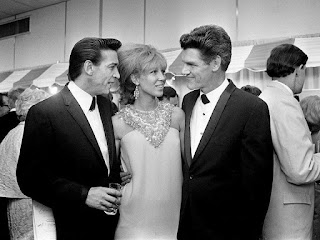Harlan Perry Howard (September 8, 1927 – March 3, 2002) was an American songwriter, principally in country music. The Dean of Nashville Songwriters once described country music as “three chords and the truth” and saw his own six-decade version of the truth told through the recordings of Patsy Cline, Ray Charles, Johnny Cash and scores more,
 Howard’s name and face would go unrecognized by casual country music fans, but not the hit recordings of songs he wrote or co-wrote, including: “I Fall to Pieces” by Cline, “Busted” by Charles, “Heartaches by the Number” by Ray Price and “Why Not Me?” by the Judds. In all, he wrote more than 4,000 songs and had more than 100 of his compositions crack the country top 10.
Howard’s name and face would go unrecognized by casual country music fans, but not the hit recordings of songs he wrote or co-wrote, including: “I Fall to Pieces” by Cline, “Busted” by Charles, “Heartaches by the Number” by Ray Price and “Why Not Me?” by the Judds. In all, he wrote more than 4,000 songs and had more than 100 of his compositions crack the country top 10.Harlan Perry Howard was born in Detroit--a publicist later persuaded him to cite a more industry-appropriate birthplace of Kentucky, but he abandoned the myth in recent years, his wife said Monday. His parents were indeed from Kentucky, and like
many of the transplants seeking work with the automobile industry, they brought their love of country and blues music to Michigan. The Depression and troubles at home splintered the family, though, and Howard spent many of his youthful nights in foster homes.He dropped out of school in the ninth grade to work as a labourer but he already had another occupation on his mind..
many of the transplants seeking work with the automobile industry, they brought their love of country and blues music to Michigan. The Depression and troubles at home splintered the family, though, and Howard spent many of his youthful nights in foster homes.He dropped out of school in the ninth grade to work as a labourer but he already had another occupation on his mind..
Inspired by Ernest Tubb, he had fancied himself a songwriter since the age of 12 and his unfolding life saga informed his lyrics with a lonesome tinge. He joined the Army in 1947 and a stint as a paratrooper gave him time to learn the guitar and took him close enough to Nashville to spend weekends there, but he found it difficult to crack the city’s songwriting club.
 |
| Buck Owens with Harlan and Jan Howard |
Moving west also led to a new friendship, with a Bakersfield singer named Buck Owens. The two would have a series of hits, but began their collaboration with the song “Mommy for a Day,” which Kitty Wells would record. Howard had by then written his first country hit, “Pick Me Up on your Way Down,” which Charlie Walker took to No. 2 on the country charts in 1958.A year later, “Heartaches by the Number” was a Howard-written hit not only for Price on the country charts, but also for Guy Mitchell, who reached No. 1 on the pop charts.
Still, the songwriter was working in a book bindery in Huntington Park for $200 a week when, in 1960, he opened the mail one day and found “Heartaches” had delivered him a royalty check for $48,000. Within days another one, for $52,000, arrived. “I went out and did the typical hillbilly thing: I bought a brand-new
white-on-white Coupe de Ville,” he told Robert Hilburn of The Times in 1992. “Paid $5,200 cash for it.... The next thing I did was move to Nashville and hit the ground running, writing day and night for 10 to 12 years.”
 |
| Waylon Jennings with Harlan |
He ran hard. In 1961, he had 15 songs on the country chart at one time. He also struck up cocktail friendships with other writers such as Hank Cochran, Willie Nelson and Roger Miller at Tootsies Orchid Lounge in Nashville, across from the Grand Ole Opry. Howard launched a recording career of his own, but unlike Nelson, he could never change his sheet-music success into a performer’s spotlight--nor was Howard willing to forgo his passion for fishing to hit the tour road.
 |
| Willie Nelson, Harlan and Hal Smith |
The reach of his hits earned him the nickname “the Irving Berlin of country music” and, more simply, “Mr. Songwriter.” Noted for his doting attention to younger generations of artists, he was famous in music circles as a mentor as well. Howard was inducted into the Nashville Songwriters Hall of Fame in 1973, the Country Music Hall of Fame in 1997, and the Songwriters Hall of Fame also in 1997.
He died of an apparent heart attack in Nashville in 2002, aged 74 after weathering a number of health problems and operations in recent years. Ongoing circulation problems in his legs limited his mobility in recent years but not his spirits, friends say. He was buried in Nashville City Cemetery.
(Edited from an article by Geoff Boucher @ The New York Times & Wikipedia)





